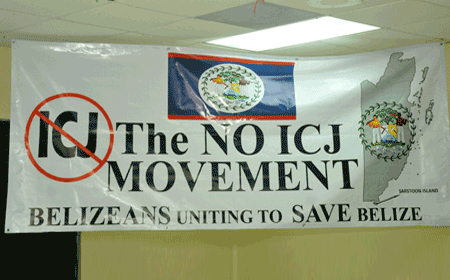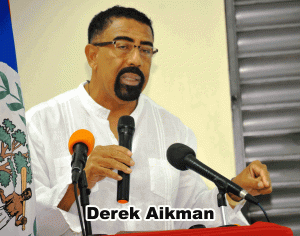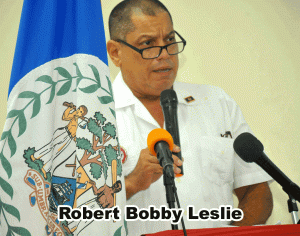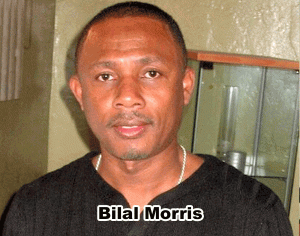On the controversial re-registration opening day, the “No ICJ Movement” was launched by nationalist organizations
BELIZE CITY, Mon. July 2, 2018– A multi-organization group hosted a press conference this morning at the Belize Institute of Management (BIM) to discuss the re-registration exercise which began today across the country, and to launch their “NO ICJ MOVEMENT.”
The group is planning to take out a constitutional claim against the Elections and Boundaries Commission and Chief Elections Officer, Josephine Tamai, who had pledged that Guatemalans holding Belize nationality papers would be allowed to be re-registered.
The group is also planning to petition government to lift the two-month residency requirement for Belizeans living in the diaspora in order for them to re-registered.
All registered voters in the country must re-register if they want to remain on the electoral list of registered voters. At midnight last night, the list of voters expired, thus the need for all persons to be re-registered. Even “born Belizeans” who did not re-register, will not be eligible to vote in future elections.
While Belizeans in the diaspora have to prove that they have lived in Belize for two months before they can qualify to re-register, naturalized Belizeans living in Belize, including Guatemalans, will be allowed to re-register without any impediment whatsoever.
The Guatemalans, for example, according to Belize law, who were not constitutionally entitled to Belizean nationality from the beginning because their country has a claim against Belize, however, will have more rights than Belizeans in the diaspora.
Six organizations are taking part on the two subjects that the organizations discussed today, the re-registration process and the International Court of Justice (ICJ) referendum, which is set for April 10, 2019.
The organizations which are partnering in these two-item national efforts are two organizations from the Belizean diaspora, BREDAA (Belize Rural Economic Development of Agriculture through Alliance); and Belize Diaspora Voting Rights, along with four home-based organizations, BUFERAD (Belizeans United for Equal Rights at home and the Diaspora); Peace Movement; Northern Territorial Volunteers; and Belize Territorial Volunteers (BTV).
The founder and leader of BUFERAD, former UDP politician and former Cabinet Minister, Derek Aikman opened the press conference explaining that “there is potential poison in the re-registration process.”
“The re-registration process is being undertaken by the Elections and Boundaries Commission, whose chairman is also the chairman of the UDP, Alberto August. That is the first thing that should cause every citizen of this nation concern,” he said.
Aikman said that “next is that over 300 workers have been hired as temporary workers to act as registering officers in the next two months, all of whom, I have good evidence to substantiate, are loyalists of the party in government.”
“So if you believe that the re-registration is going to take place on an even keel, without corruption, I want to dissuade you of that notion,” Aikman added.
Aikman explained that unless the day-to-day registration process can be monitored, anything can happen. The same voters list that dissolved at midnight last night was full of corruption with people registered at addresses where they do not live; the very same outcome can take place in this re-registration process, he said.
Aikman explained that the potential for rampant fraud with 300 untrained registration officers is real unless the system is monitored. How does one prove that someone has been living at an address for two months? It’s not even enough time to get a utility bill in your name, Aikman stressed.
Aikman added, “The way the registration process is set up in Belize, it gives the ruling party total control, and they both use it to their advantage.”
Aikman then turned his attention to Belizeans living in the diaspora: there was a time when they used to fly them in by the plane loads; sometimes, they charter flights to bring them in to vote, but this time, as the Chief Elections Officer said, they have to be living at an address for two months, he said.
“So Belizeans born in Belize and who were registered on the last list as voters won’t qualify to get onto this list through re-registration. But Guatemalans who have been nationalized as Belizeans citizens in contravention of the very constitution of this nation that says no country’s citizens that claim Belize can get Belizean citizenship,” Aikman explained, “Yet, there are over 30-odd thousand Guatemalans who were on the last list, that the Chief Elections Officer has said will be allowed to go back on this list.”
Aikman said that the reason they split the Immigration Department in two, one part to deal with citizenship and one part to deal with border management, is because there is an underground process to continue the nationalization of Guatemalans.
Aikman carefully explained that the timing of the re-registration is no accident, that it came after the municipal elections so that the government can have an idea of which constituencies they are lagging behind in, and it’s coming ahead of the ICJ referendum because they know that the majority of Belizeans in the diaspora would vote “no” in the ICJ referendum.
Why is this important? Aikman asked. It is important because it is the same government which changed our referendum threshold from 60 percent to a simple majority to acquiesce to Guatemala. So on the day of the referendum, if only 20 persons vote, yes or no, only one vote is needed to carry the referendum, he said.
This is simply one more step in a long history of strategic planning and conspiracy by the present administration to bring a “yes” vote in a referendum to the ICJ.
Aikman said the government also deviated from the idea that the referendum should have been held on the same date as the Guatemalan referendum. They just threw that through the window so that Guatemala voted ahead of us.
The next phase of Aikman’s presentation had to do with the ICJ referendum: they wanted Belizeans to listen to the campaign coming out of the Referendum Unit of the Ministry of Foreign Affairs, that they will tell us the pros and the cons. And they would leave it up to the intelligence of the Belizean voters, having heard both sides of the coin as to how they want to vote, he said.
Aikman characterized the ICJ education process as “another deception, in fact a total lie.” They tell us why we need to go. They tell us that we have an iron-clad case, that Guatemala has everything to lose, but they don’t tell us what the risks are to Belize of going to the ICJ. All it is, is a yes campaign, there is no “no,” Aikman pointed out.
Citing Prime Minister Barrow’s assertion at one of his press conferences that he would vote yes in the ICJ referendum, all 31 constituencies are being encouraged to vote yes to going to the ICJ, making it a partisan campaign, Aikman explained.
“We are still waiting on the Leader of the Opposition to tell us what will be the People’s United Party’s position on the ICJ referendum,” Aikman said.
Aikman is of the view that when the PUPs announce their ICJ referendum position, they will opt for a yes vote.
“So we have decided that we cannot leave the Belizean people without impetus, without guidance and championing the cause of all Belizeans at home and abroad who are against going to the ICJ,” Aikman said.
Having said that, Aikman declared that they are prepared to be the official “no to the ICJ” campaign, and a large banner was unveiled with the “No ICJ Vote, Belizeans united to save Belize.”
Aikman promised to present documented facts why Belize does not need to go to the ICJ to determine where our borders are.
“Our leaders are acquiescing to powers greater than they respect the will of the Belizean people,” Aikman declared, “but we will take the matter to court as a constitutional challenge that Guatemalans, even if they put them on the list, will be struck off before the referendum date.”
Following Aikman’s presentation, Bilal Morris, the public relations officer of BREDAA, addressed the press conference via a Skype call.
Morris explained that the Belizean diaspora has hosted both PUP and UDP government representatives over the years, and especially the UDP prior to its 1984 victory when it leaned on the Belizeans in the diaspora to secure financing for their political campaign.
The Musa administration can attest to the economic power of the Belizeans in the diaspora in 1998, Morris added.
The governments, both past and present, have violated the constitution of Belize to register and give Belizean nationality to Guatemalans. Our message today on behalf of the Belizeans in the diaspora, is that they are very upset and very annoyed by this message that the government is sending to them, Morris said.
Morris called on the government of the day to make the necessary legislation to give back the constitutional rights of Belizeans in the diaspora to vote and be a part of the democratic process. Morris cites US citizens who are allowed to vote in US elections by proxy.
Morris makes the point that the Guatemalan people, although they have pledged allegiance to the US, are still Guatemalans. But the Belizeans in the diaspora are not given that right, he said.
Morris called on the government to amend the antiquated colonial constitution to bridge the gap between Belizeans at home and Belizeans in the diaspora.
Robert “Bobby” Leslie, the western coordinator and leader of the Peace Now Movement, spoke next. Leslie said that we are about 9 months from April 10, 2019.
Holding up his copy of the Belize Constitution, Leslie said that when our elected leaders violate the constitution, we the people, together with the courts, must hold them accountable.
This is the supreme law; this is what makes us Belizeans, he said.
Leslie went on to explain that the signing of the Compromis is “a violation of our constitution” and we in the peace movement, joined now by BUFERAD, BTV, NTV and our brothers in the US, are prepared to take the government to court….”
Leslie went on to read from article 2 of the Special Agreement (the Compromis): “Whereas the parties request the court to determine, in accordance with applicable rules of international law as specified in article 38-1 of the statute of the court, any and all legal claims of Guatemala against Belize to land and insular territories, and to any maritime areas pertaining to these territories to declare the rights therein of both parties, and to determine the boundaries between their respective territories and areas.”
“Belizeans you will know that our constitution defines the boundaries that we inherited in 1981. There was no doubt where our borders were on September 21, 1981. Only a two-thirds vote of the House can changed those defined boundaries of Belize… nothing else,” Leslie explained.
Leslie went on to explain that the Compromis is procedurally wrong, because only the House of Representatives can change the borders of Belize with a two-thirds vote.
So we are asking the court to determine that the Minister of Foreign Affairs exceeded his executive authority when he signed that Special Agreement, Leslie added…We cannot allow our elected leader to usurp this law. We are calling on attorneys across the country to help us lodge this. We, along with our brothers, are prepared to take this all the way to the CCJ (Caribbean Court of Justice), Leslie said, explaining that this is a class action suit against the government.
Leslie said, “We are at the point where we are almost ready to lodge it at the Supreme Court.”




